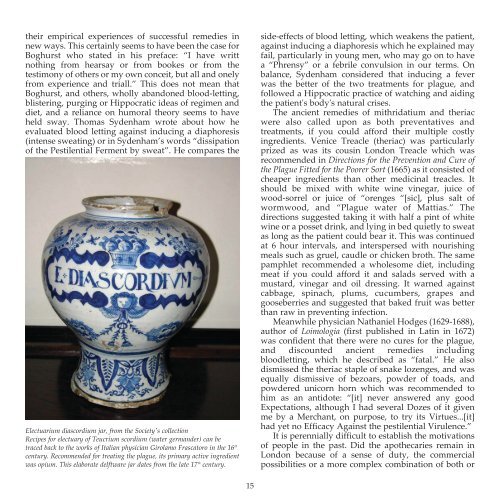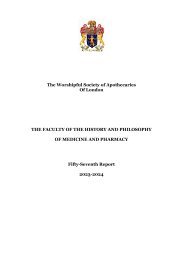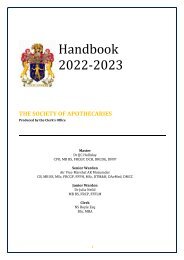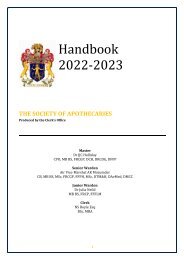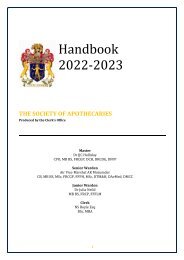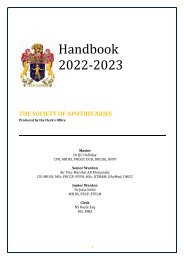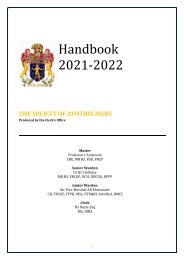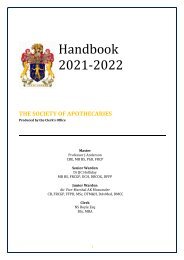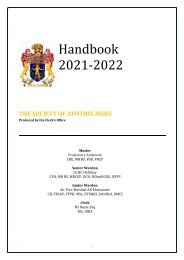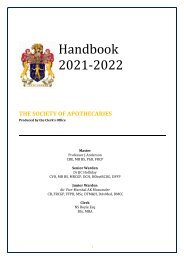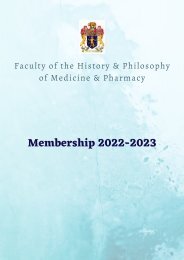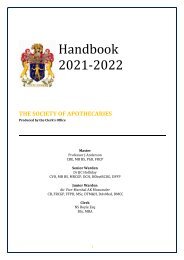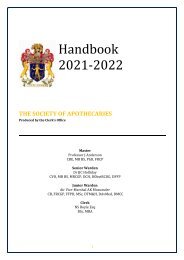Apothecary 2020
Journal of the Worshipful Society of Apothecaries for Master's Year 2019-20
Journal of the Worshipful Society of Apothecaries for Master's Year 2019-20
You also want an ePaper? Increase the reach of your titles
YUMPU automatically turns print PDFs into web optimized ePapers that Google loves.
their empirical experiences of successful remedies in<br />
new ways. This certainly seems to have been the case for<br />
Boghurst who stated in his preface: “I have writt<br />
nothing from hearsay or from bookes or from the<br />
testimony of others or my own conceit, but all and onely<br />
from experience and triall.” This does not mean that<br />
Boghurst, and others, wholly abandoned blood-letting,<br />
blistering, purging or Hippocratic ideas of regimen and<br />
diet, and a reliance on humoral theory seems to have<br />
held sway. Thomas Sydenham wrote about how he<br />
evaluated blood letting against inducing a diaphoresis<br />
(intense sweating) or in Sydenham’s words “dissipation<br />
of the Pestilential Ferment by sweat”. He compares the<br />
Electuarium diascordium jar, from the Society's collection<br />
Recipes for electuary of Teucrium scordium (water germander) can be<br />
traced back to the works of Italian physician Girolamo Frascatoro in the 16 th<br />
century. Recommended for treating the plague, its primary active ingredient<br />
was opium. This elaborate delftware jar dates from the late 17 th century.<br />
side-effects of blood letting, which weakens the patient,<br />
against inducing a diaphoresis which he explained may<br />
fail, particularly in young men, who may go on to have<br />
a “Phrensy” or a febrile convulsion in our terms. On<br />
balance, Sydenham considered that inducing a fever<br />
was the better of the two treatments for plague, and<br />
followed a Hippocratic practice of watching and aiding<br />
the patient's body's natural crises.<br />
The ancient remedies of mithridatium and theriac<br />
were also called upon as both preventatives and<br />
treatments, if you could afford their multiple costly<br />
ingredients. Venice Treacle (theriac) was particularly<br />
prized as was its cousin London Treacle which was<br />
recommended in Directions for the Prevention and Cure of<br />
the Plague Fitted for the Poorer Sort (1665) as it consisted of<br />
cheaper ingredients than other medicinal treacles. It<br />
should be mixed with white wine vinegar, juice of<br />
wood-sorrel or juice of “orenges “[sic], plus salt of<br />
wormwood, and “Plague water of Mattias.” The<br />
directions suggested taking it with half a pint of white<br />
wine or a posset drink, and lying in bed quietly to sweat<br />
as long as the patient could bear it. This was continued<br />
at 6 hour intervals, and interspersed with nourishing<br />
meals such as gruel, caudle or chicken broth. The same<br />
pamphlet recommended a wholesome diet, including<br />
meat if you could afford it and salads served with a<br />
mustard, vinegar and oil dressing. It warned against<br />
cabbage, spinach, plums, cucumbers, grapes and<br />
gooseberries and suggested that baked fruit was better<br />
than raw in preventing infection.<br />
Meanwhile physician Nathaniel Hodges (1629-1688),<br />
author of Loimologia (first published in Latin in 1672)<br />
was confident that there were no cures for the plague,<br />
and discounted ancient remedies including<br />
bloodletting, which he described as “fatal.” He also<br />
dismissed the theriac staple of snake lozenges, and was<br />
equally dismissive of bezoars, powder of toads, and<br />
powdered unicorn horn which was recommended to<br />
him as an antidote: “[it] never answered any good<br />
Expectations, although I had several Dozes of it given<br />
me by a Merchant, on purpose, to try its Virtues...[it]<br />
had yet no Efficacy Against the pestilential Virulence.”<br />
It is perennially difficult to establish the motivations<br />
of people in the past. Did the apothecaries remain in<br />
London because of a sense of duty, the commercial<br />
possibilities or a more complex combination of both or<br />
15


